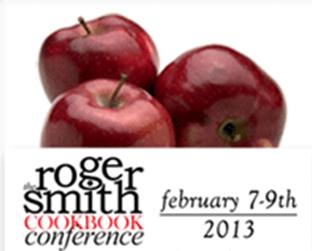 Nirvana – a place of bliss – is my word for a cookbook conference taking place in New York City next month. If you are a lover of cookbooks, like I am -- a writer, or simply an avid user -- this may be just the weekend for you. The conference promises a tantalizing array of panels (from “Give Us This Bread: Christianity in Cookbooks;” “In the Night Kitchen: Why Write Cookbooks for Kids;” Trendspotting in the Food Space;” to “Publishers and Food Bloggers -- Creating a Productive Partnership”); distinguished guests (Amanda Hesser, Arthur Schwartz, Molly O’Neill, Mollie Katzen), and illuminating workshops (from “The Wild World of Self Publishing” to “The Way to Look: How To Do Research with Cookbooks”), all under one roof at the Roger Smith Hotel on Lexington Avenue. And if that is not enough to whet one’s appetite, I’m told that the food served at last year’s conference, thanks to chef Daniel Mowles, was very good indeed.
But cookbook aficionados do not live by food alone and judging by the erudition of this year’s panelists, the real sustenance is about ideas, culinary history, process, and politics.
Nirvana – a place of bliss – is my word for a cookbook conference taking place in New York City next month. If you are a lover of cookbooks, like I am -- a writer, or simply an avid user -- this may be just the weekend for you. The conference promises a tantalizing array of panels (from “Give Us This Bread: Christianity in Cookbooks;” “In the Night Kitchen: Why Write Cookbooks for Kids;” Trendspotting in the Food Space;” to “Publishers and Food Bloggers -- Creating a Productive Partnership”); distinguished guests (Amanda Hesser, Arthur Schwartz, Molly O’Neill, Mollie Katzen), and illuminating workshops (from “The Wild World of Self Publishing” to “The Way to Look: How To Do Research with Cookbooks”), all under one roof at the Roger Smith Hotel on Lexington Avenue. And if that is not enough to whet one’s appetite, I’m told that the food served at last year’s conference, thanks to chef Daniel Mowles, was very good indeed.
But cookbook aficionados do not live by food alone and judging by the erudition of this year’s panelists, the real sustenance is about ideas, culinary history, process, and politics.
According to the conference organizers the event is an “eclectic gathering of those who publish, write, edit, agent, research, or simply buy and use cookbooks.” In other words, there is something for everyone -- even collectors, who might enjoy a panel entitled “Cookbooks as Works of Art.”
Andrew Smith, the conference founder, charmingly takes “credit (or blame),” for launching the idea last year. He teaches food history and professional food writing at the New School for Social Research in New York, and is the author and/or editor of 23 books. His latest works include American Tuna: The Rise and Fall of an Improbable Food, and Drinking History: 15 Turning Points in the Making of American Beverages. And while he has never published an actual cookbook, Professor Smith uses them constantly in his own research and wanted to explore the vicissitudes of the field. Because “cookbook publishing is changing so rapidly – self-publishing, printing on demand, blogging, online cookbooks, websites filled with recipes, and culinary apps,” Mr. Smith said that he didn’t understand what was underway – or where the genre was headed. After talking with many cookbook writers and publishers, he concluded that no one else did either, “although many had insights and opinions.” After last year’s triumphant conference, Mr. Smith felt his teaching and research methods had improved simply by attending the event and feeding off the vast culinary brain trust that had gathered.
To find out more about the conference, go to www.cookbookconf.com and save a place for yourself! You’ll find me in the “Night Kitchen” – talking about the challenges of researching, writing and publishing books for children with moderator Laura Shapiro – one of the finest minds in the culinary world.
Why does this conference matter? After all, we seem to have shifted from a cooking society to an eating society, so is there any real point to the annual tsunami of cookbooks being published? My answer is without a doubt. We are a nation obsessed with food, but the rules of the game are changing.